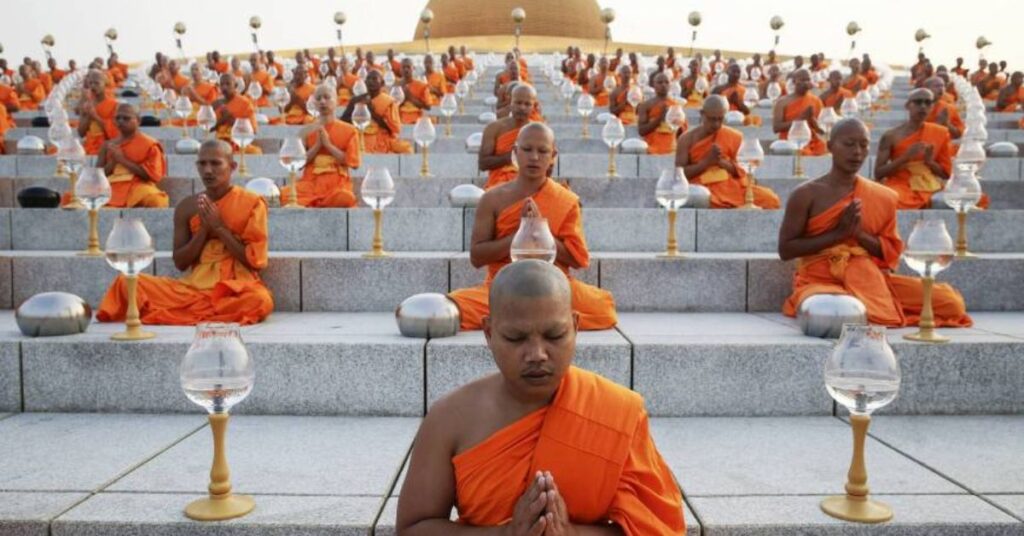When you're diving into the world of monastic life or even just exploring spirituality, good monk names can play a significant role in shaping your journey. These names aren't just labels; they carry meaning, history, and a sense of purpose that can guide you through your path. Whether you're looking for inspiration or authenticity, this article will take you on an enlightening journey to discover some of the most compelling monk names.
So, why exactly are good monk names so important? Think about it like this: a name is like a compass. It sets the tone for who you are and what you stand for. For monks, their names often reflect their values, beliefs, and aspirations. They're more than just words; they're symbols of devotion, wisdom, and enlightenment. So, if you're on the hunt for the perfect monk name, you've come to the right place.
In this article, we'll explore the art of choosing meaningful monk names, delve into their significance, and provide you with a treasure trove of options. Whether you're a spiritual seeker, a writer crafting a character, or simply someone fascinated by the monastic way of life, this guide will help you uncover the hidden gems of monk names. Let's dive in!
Read also:Adolfo Cubas Joven The Rising Star In The Spotlight
Here’s a quick table of contents to help you navigate through this spiritual adventure:
- The History of Monk Names
- The Significance of Monk Names
- Popular Good Monk Names
- How to Choose a Good Monk Name
- Spiritual Meanings Behind Monk Names
- Inspiration for Monk Names
- Cultural Influences on Monk Names
- Unique Monk Names
- Modern Monk Names
- Final Thoughts
The History of Monk Names
Monk names have a rich history that dates back centuries. In many religious traditions, monks take on new names when they enter monastic life. This practice symbolizes a transformation—a shedding of their old identity and embracing a new one dedicated to spiritual growth. The tradition varies across cultures and religions, but the essence remains the same.
In Buddhism, for instance, monks often receive names that reflect virtues such as compassion, wisdom, or peace. Similarly, in Christianity, monks might adopt names of saints or biblical figures, drawing inspiration from their teachings and example. These names serve as constant reminders of their spiritual goals and the values they strive to embody.
Monk Names in Different Cultures
Let's take a closer look at how different cultures approach monk names:
- Buddhism: Names often include elements like "Dharma" (truth), "Sangha" (community), or "Metta" (loving-kindness).
- Christianity: Monks may choose names like "Francis" (after St. Francis of Assisi) or "Ignatius" (after St. Ignatius of Loyola).
- Hinduism: Names might incorporate Sanskrit words related to devotion or enlightenment, such as "Swami" or "Guru."
Understanding the cultural context behind these names adds depth to their meaning and significance.
The Significance of Monk Names
Good monk names hold profound significance. They're not just random selections; they're carefully chosen to align with the monk's spiritual journey. Each name carries a message, a story, or a lesson. For example, a monk named "Ananda," which means "bliss" in Sanskrit, might focus on cultivating inner joy and contentment. Similarly, a monk named "Thomas," meaning "twin," might explore themes of duality and unity.
Read also:Kp Rutland A Comprehensive Guide To The Rising Star
These names act as guiding lights, reminding monks of their purpose and helping them stay connected to their spiritual roots. They also serve as a way to honor revered figures in their tradition, creating a sense of continuity and connection to those who came before them.
How Monk Names Influence Daily Life
Imagine waking up every morning and reflecting on the meaning of your name. That's what it's like for monks. Their names influence how they approach each day, shaping their thoughts, actions, and decisions. It's like having a personal mantra that keeps them grounded and focused on their path.
Popular Good Monk Names
Now, let's dive into some popular good monk names that have stood the test of time. These names are not only meaningful but also resonate with people across different traditions. Here are a few examples:
- Thich Nhat Hanh: A renowned Vietnamese Zen master known for his teachings on mindfulness and peace.
- Dalai Lama: The spiritual leader of Tibetan Buddhism, embodying compassion and wisdom.
- Brother David Steindl-Rast: A Benedictine monk famous for his work on gratitude and interfaith dialogue.
- Sister Chan Khong: A Vietnamese nun and peace activist who has dedicated her life to helping others.
These names represent more than just individuals; they symbolize entire movements and philosophies that continue to inspire people worldwide.
Why These Names Stand Out
What makes these names so special? It's their ability to encapsulate complex ideas in simple, powerful words. They evoke emotions, spark curiosity, and invite deeper exploration. Whether you're drawn to the tranquility of "Thich Nhat Hanh" or the wisdom of the "Dalai Lama," these names offer something for everyone.
How to Choose a Good Monk Name
Choosing a good monk name isn't as straightforward as flipping through a baby name book. It requires thought, reflection, and a deep understanding of what resonates with you. Here are some tips to help you make the right choice:
- Reflect on Your Values: Think about what matters most to you—peace, love, wisdom, or something else. Let that guide your selection.
- Consider Your Tradition: If you're part of a specific religious or spiritual tradition, look for names that align with its teachings.
- Explore Meanings: Research the meanings behind different names to find one that speaks to your soul.
- Seek Guidance: Don't hesitate to ask mentors, teachers, or fellow practitioners for advice. They might offer insights you hadn't considered.
Remember, your monk name should feel like an extension of yourself—a reflection of who you are and who you aspire to become.
Avoiding Common Mistakes
While choosing a monk name, it's easy to fall into certain traps. Avoid picking names that are too trendy or overly complicated. Simplicity and authenticity are key. Also, be mindful of cultural sensitivities. Just because a name sounds cool doesn't mean it's appropriate or respectful.
Spiritual Meanings Behind Monk Names
Every good monk name carries spiritual significance. Let's explore some common themes and their meanings:
- Peace: Names like "Shanti" (Sanskrit for peace) or "Serenus" (Latin for serene) emphasize the importance of inner calm and harmony.
- Wisdom: "Siddhartha" (meaning "one who has achieved his goal") or "Sofia" (Greek for wisdom) highlight the pursuit of knowledge and understanding.
- Compassion: "Metta" (Pali for loving-kindness) or "Caritas" (Latin for charity) focus on kindness and empathy towards others.
By choosing a name with spiritual meaning, monks align themselves with universal principles that transcend individual identities.
Connecting with Your Inner Self
Your monk name should resonate with your inner self. It should feel like a natural fit, something that feels right from the moment you hear it. This connection is crucial because it serves as a daily reminder of your spiritual commitments and aspirations.
Inspiration for Monk Names
Where do monks find inspiration for their names? The sources are as diverse as the individuals themselves. Some draw inspiration from nature, others from literature, and still others from historical figures. Here are a few examples:
- Nature-Inspired Names: "Avalokiteshvara" (Sanskrit for the bodhisattva of compassion) or "Elohim" (Hebrew for God of nature).
- Literary References: "Gandalf" (from J.R.R. Tolkien's works, symbolizing wisdom) or "Aeneas" (from Virgil's Aeneid, representing courage).
- Historical Figures: "Martin" (after Martin Luther King Jr., symbolizing justice) or "Teresa" (after Mother Teresa, representing service).
The possibilities are endless, and the key is to find what speaks to you personally.
Personalizing Your Monk Name
Don't be afraid to put your own spin on traditional monk names. Maybe you want to combine elements from different traditions or create a hybrid name that reflects your unique journey. As long as it feels authentic and meaningful, it's worth considering.
Cultural Influences on Monk Names
Culture plays a significant role in shaping monk names. Different regions and traditions have their own naming conventions and preferences. For example, Tibetan monks often use names that incorporate the word "Rinpoche," meaning "precious one." In contrast, Zen monks might prefer names that reflect simplicity and humility.
Understanding these cultural nuances can enhance your appreciation for the diversity within monastic traditions. It also highlights the universal themes that connect monks across borders and beliefs.
Embracing Cultural Diversity
When exploring monk names, embrace the richness of cultural diversity. Don't limit yourself to one tradition or style. Instead, explore various options and see what resonates with you. You might discover unexpected connections and insights along the way.
Unique Monk Names
For those seeking something truly distinctive, here are some unique monk names to consider:
- Amitabha: A name from Mahayana Buddhism meaning "infinite light."
- Abhayagiri: A Sanskrit name meaning "fearless mountain," symbolizing strength and resilience.
- Eirene: A Greek name meaning "peace," often used by Christian monks.
These names stand out not just for their uniqueness but also for their profound meanings and historical significance.
Making Your Name Stand Out
If you're looking for a name that sets you apart, consider combining elements from different languages or traditions. This approach allows you to create something entirely new while still honoring the roots of monastic naming practices.
Modern Monk Names
In today's world, monk names are evolving to reflect contemporary values and concerns. Modern monks might choose names that emphasize environmental stewardship, social justice, or digital mindfulness. Here are a few examples:
- EcoDharma: A name that combines ecology and spiritual practice.
- DigitalSangha: Reflecting the intersection of technology and community.
- SocialJustice: Highlighting the importance of equality and fairness.
These names show that monk names can be both timeless and timely, adapting to the needs of the present moment.
Adapting to Modern Times
As the world changes, so do the ways we express our spirituality. Modern monk names reflect this evolution, offering new perspectives on age-old traditions. They remind us that spirituality is a living, breathing force that continues to grow and transform alongside us.
Final Thoughts
In conclusion, good monk names are more than just words; they're powerful symbols that guide and inspire. Whether you're a practicing monk or simply someone fascinated by the concept, exploring monk names can deepen your understanding of spirituality and its many facets.
So, what's next? Take some time to reflect on what resonates with you. Explore the names and meanings discussed in this article, and don't be afraid to create your own unique name if that feels right. Remember, your monk name should be a reflection of who you are and who you aspire to become.
And hey,


